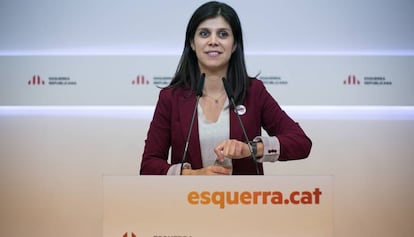Catalan separatist party in “no hurry” to help Spain’s caretaker PM return to power
After meeting with Socialist representatives, the Catalan Republican Left says it sees a new willingness to talk, but that further negotiation is required for a pledge of abstention

The Catalan Republican Left (ERC), a separatist party that could be pivotal to the formation of a new government in Spain, is in “no hurry” to reach a deal with caretaker prime minister Pedro Sánchez of the Socialist Party (PSOE), who is seeking to get confirmed in the post after winning the November 10 election.
“During our meeting they explained that they are working with a more rushed timetable, and we said that we are in no hurry,” said ERC spokeswoman Marta Vilalta on Friday, alluding to the PSOE’s desire to get a government up and running before Christmas.
If we don’t want repeat elections, we need to appoint a government, and for that, somebody needs to abstain
Acting foreign minister Josep Borrell
The repeat election of November 10 gave a victory to Sánchez, but not enough of a majority. Although the Socialist leader has reached a preliminary deal for a coalition government with the anti-austerity Unidas Podemos, he will still need backing – or at least an abstention – from other forces in parliament at a two-round investiture session that must be held in the coming weeks.
Failure to secure this support could lead to yet another repeat vote in a country that has held four general elections in the last four years, reflecting the new political fragmentation.
Vilalta, whose party has 13 lawmakers in the Spanish Congress, said after the first meeting between the negotiating teams that “there is a willingness to talk” that had not been there before, although no deals have been struck. She insisted that the important thing was that the PSOE recognize “that there is a political conflict in Catalonia.” A second meeting is scheduled for December 3.
Ruling on Junqueras

Oriol Junqueras will know before Christmas whether Spanish authorities should have acknowledged his status as a MEP after winning a seat in the European elections of May. The EU Court of Justice said it will deliver a judgment on December 19. Junqueras has been convicted of sedition in Spain and sentenced to 13 years in prison. A favorable decision by the European court could also affect former Catalan premier Carles Puigdemont, who fled to Belgium after the unilateral independence declaration in 2017 and is fighting extradition to Spain to face similar charges as his former deputy Junqueras.
The PSOE is seeking an abstention at the investiture session from ERC, whose leader Oriol Junqueras was recently sentenced to prison over his role in the 2017 Catalan breakaway attempt.
Spain’s acting foreign minister, Josep Borrell, on Friday conceded that depending on a party whose leader is in jail for sedition is an “anomalous” situation. In an interview on the radio station Onda Cero, Borrell – who is about to leave his job to become the EU’s new High Representative for Foreign Affairs and Security Policy – noted that there is another way for Sánchez to get endorsed without having to rely on Catalan separatist parties. But that would involve an abstention from the conservative Popular Party (PP).
“If we don’t want repeat elections, we need to appoint a government, and for that, somebody needs to abstain,” he said. “If the PP doesn’t want to, we’ll see if anybody else does. We may like it more or less, but that’s the situation. Why does the PP, which complains so much about separatists’ decisive influence, not facilitate it?”
English version by Susana Urra.
Tu suscripción se está usando en otro dispositivo
¿Quieres añadir otro usuario a tu suscripción?
Si continúas leyendo en este dispositivo, no se podrá leer en el otro.
FlechaTu suscripción se está usando en otro dispositivo y solo puedes acceder a EL PAÍS desde un dispositivo a la vez.
Si quieres compartir tu cuenta, cambia tu suscripción a la modalidad Premium, así podrás añadir otro usuario. Cada uno accederá con su propia cuenta de email, lo que os permitirá personalizar vuestra experiencia en EL PAÍS.
¿Tienes una suscripción de empresa? Accede aquí para contratar más cuentas.
En el caso de no saber quién está usando tu cuenta, te recomendamos cambiar tu contraseña aquí.
Si decides continuar compartiendo tu cuenta, este mensaje se mostrará en tu dispositivo y en el de la otra persona que está usando tu cuenta de forma indefinida, afectando a tu experiencia de lectura. Puedes consultar aquí los términos y condiciones de la suscripción digital.








































